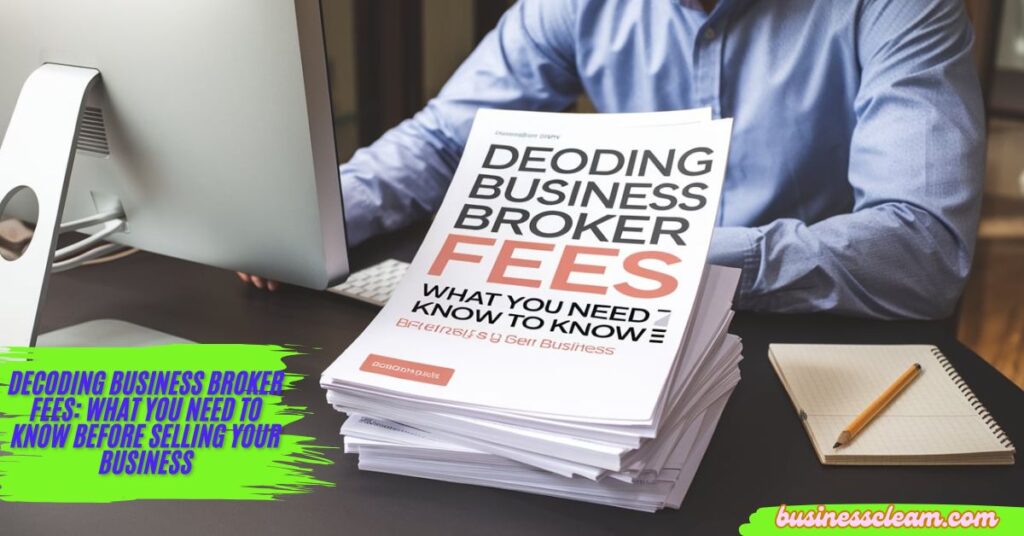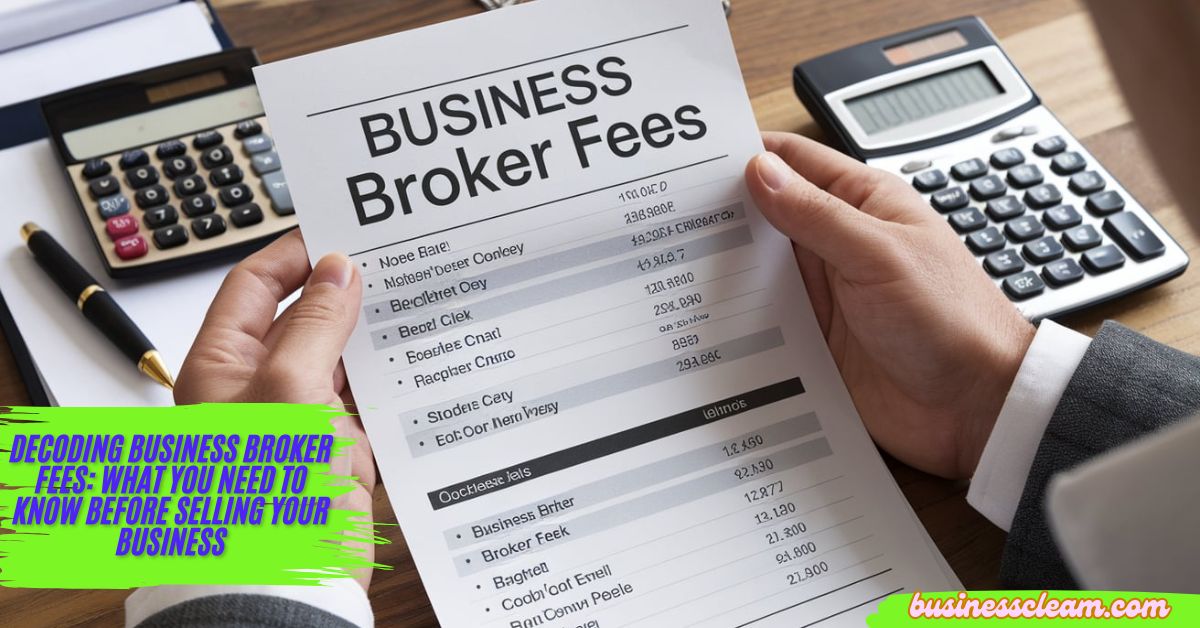Business broker fees refer to the charges paid to professionals who help sell your business. These fees can include commissions, which are a percentage of the sale price, or fixed payments for specific services like business valuations. A business broker assists with the sale process, from finding buyers to negotiating terms, and these fees cover their work. Understanding these fees is key to knowing how much it will cost to sell your business.
Before you decide to sell, it’s important to understand how much a business broker will charge. The fees can vary based on the size of your business, the industry, and the broker’s experience. Some brokers may charge high fees, while others may have lower costs. Getting a clear idea of the fees helps you make an informed decision about whether hiring a broker is worth it.
Business broker fees typically include a success fee, which is a percentage of the sale price, and sometimes a retainer for upfront services. The success fee depends on the business’s value and can range from 5% to 10% for smaller businesses. These fees might seem high, but brokers often help secure better deals, saving time and effort. It’s essential to weigh the costs against the potential benefits.
What Are Business Broker Fees?
Business broker fees are the charges paid to professionals who assist in selling your business. These fees compensate brokers for their expertise in valuing the business, marketing it to potential buyers, and ensuring a smooth negotiation process. Typically, the fees are calculated as a percentage of the final sale price, known as a success fee. In some cases, brokers also charge additional fees for services like business valuations or initial consultations.
Understanding broker fees is crucial because they directly impact your overall profit from the sale. While the costs might seem high initially, the benefits of hiring a skilled broker often outweigh the expenses. A professional broker can help secure a better sale price, saving you time and effort while maximising the value of your business.
How Business Brokers Get Paid
Business brokers primarily earn through two payment models: success fees and retainers. A success fee is a commission, often a percentage of the sale price, paid only after the deal is successfully closed. This incentivizes brokers to work diligently to secure the highest possible sale price for your business. On the other hand, some brokers charge retainers, which are upfront or recurring payments covering initial services like valuations, market research, or preparing marketing materials.
The method of payment depends on the broker and the business being sold. Success fees are common for smaller businesses, while retainers are more frequent in complex, high-value transactions. Before hiring a broker, it’s essential to clarify their payment structure to avoid unexpected costs and ensure it aligns with your budget.
Factors That Influence Broker Fees
Several factors affect the fees charged by business brokers. The size of your business is one of the biggest determinants; smaller businesses often face higher percentage fees, while larger ones pay lower percentages due to the higher total value of the deal. Additionally, the industry you operate in can play a role specialized industries may command higher fees due to the expertise required to navigate unique market conditions.
Another crucial factor is the broker’s experience and reputation. Highly experienced brokers with a strong track record of successful sales often charge more because they bring added value to the table. Market conditions, such as the demand for businesses in your sector, can also influence the fees. It’s important to discuss these factors upfront to ensure transparency and value for your money.
Typical Broker Fees by Business Size
Here’s a closer look at fees based on business size:
| Business Type | Revenue Range | Typical Fees | Minimum Fees |
| Main Street Businesses | Less than $1M | 8%–10% | $10,000–$15,000 |
| Lower Middle Market | $1M–$50M | Double Lehman Formula or ~4% | $35,000–$50,000 |
| Middle Market | Over $25M | 1%–4% | Varies by deal size |
For smaller businesses, fees are typically higher due to the effort required. Larger transactions may involve complex negotiations but lower percentages.
Retainers: Do You Need to Pay Them?

Retainers are fixed fees some brokers charge upfront or monthly. They cover costs like valuations and marketing. Retainers are more common in larger deals but can vary widely.
To decide if a retainer is justified:
- Check the broker’s track record.
- Ensure the retainer aligns with your transaction size.
- Understand what services the retainer covers.
If you’re selling a smaller business, avoid firms charging high retainers upfront.
How to Negotiate Broker Fees
Here’s how to secure the best deal with your broker:
- Ask for Multiple Quotes: Compare fees and services from several brokers.
- Discuss Fee Reductions: Negotiate a lower percentage for larger deals.
- Clarify Minimum Fees: Ensure you know the minimum commission, especially for smaller deals.
- Request a Fee Breakdown: Ask brokers to explain what their fees include.
Transparency is key. The right broker will prioritise your interests while earning fair compensation.
Common Fee Structures Explained
Business brokers use various fee structures, including:
- Percentage-Based Fees:
- Common for Main Street businesses.
- Fees decrease as the business size increases.
- Flat Fees:
- Used for straightforward transactions.
- Popular in lower middle market deals.
- Mixed Models:
- Combines percentage and flat fees.
- Suits complex transactions with multiple components.
Each structure has pros and cons. Choose what fits your business size and complexity.
Hidden Costs and How to Avoid Them
Brokers may charge extra fees for:
- Marketing: Listing your business in premium directories.
- Valuations: Comprehensive financial assessments.
- Consultations: Strategic advice or due diligence.
To avoid surprises:
- Request a detailed fee agreement.
- Ask if additional costs are refundable.
- Work only with transparent brokers.
Choosing the Right Broker for Your Business
When selecting a broker, consider:
- Experience: Ensure they’ve handled deals in your industry.
- Transparency: Avoid brokers who hesitate to disclose fees.
- Reputation: Check reviews and client references.
Questions to ask include:
- What is your success rate?
- How do you justify your fees?
- Do you have experience selling businesses like mine?
Case Studies: Real-Life Examples of Broker Fees
- Main Street Example: A $500,000 business sale with 10% commission resulted in a $50,000 fee.
- Lower Middle Market Example: A $3M deal using the Double Lehman formula cost $240,000 in fees.
- Middle Market Example: A $30M sale with a 2% success fee totaled $600,000 in fees.
These examples highlight how fees vary but ensure professional value.
Are Business Broker Fees Worth It?
Business brokers offer:
- Expertise in pricing and negotiations.
- Access to qualified buyers.
- Faster, smoother transactions.
While fees can seem high, brokers often secure better deals than DIY sales. Their guidance often pays for itself in the final sale price.
DIY vs. Hiring a Broker: Weighing Your Options
Selling your business independently has its advantages, such as avoiding broker fees and maintaining full control of the process. However, it can be time-consuming and challenging, especially if you lack experience in valuing businesses or negotiating deals. DIY sales also come with the risk of undervaluing your business, leading to lower profits.
Hiring a broker, on the other hand, brings professional expertise, access to a network of qualified buyers, and a more streamlined process. While broker fees can be significant, they often pay for themselves by securing a better sale price and saving you time and effort. Consider your resources and the complexity of your business before deciding whether to go it alone or seek professional help.
Key Takeaways on Business Broker Fees
Business broker fees are an essential consideration when planning to sell your business. Success fees, typically a percentage of the sale price, are the most common form of payment, while some brokers may charge retainers for upfront services. The total cost depends on factors like the size of the business, industry complexity, and the broker’s experience.
When choosing a broker, prioritise transparency and ensure their services justify the costs. Negotiating fees and understanding what they include can save you from unexpected expenses. Remember, a skilled broker not only simplifies the sales process but also helps maximise the value of your business, making their fees a worthwhile investment.
Conclusion
Understanding business broker fees is crucial when selling your business. These fees can vary based on factors like your business’s size, industry, and the broker’s experience. While the fees might seem significant, a professional broker can offer valuable expertise and guidance, helping you secure the best deal possible. Whether you choose to hire a broker or go the DIY route, it’s important to fully understand the costs involved. By doing your research and considering all your options, you can make an informed decision that best suits your needs and ensures a smooth business sale process.
FAQs
What Are Business Broker Fees?
Business broker fees are the charges that brokers collect for helping you sell your business. These fees usually come in the form of a commission, which is a percentage of the sale price. Some brokers may also charge flat fees or retainers.
How Much Do Business Brokers Charge?
Business brokers typically charge between 5% to 10% of the sale price for businesses valued under $1 million. For larger businesses, fees may range from 1% to 5%, depending on the sale price and complexity of the transaction.
What Is the Difference Between a Success Fee and a Retainer?
A success fee is paid only when your business sells, and it’s a percentage of the sale price. A retainer is a fee paid upfront, either as a flat amount or on a monthly basis, regardless of whether the sale happens.
Can I Negotiate Business Broker Fees?
Yes, you can negotiate broker fees. Many brokers are willing to adjust their commission rates based on the size of the deal, the complexity of the transaction, or the services they provide. Be sure to discuss this upfront.
Do I Need a Business Broker to Sell My Business?
While hiring a business broker is not mandatory, they can offer valuable services like business valuation, marketing, and negotiation. If you prefer handling the sale on your own, you may choose to sell the business without a broker, but it requires time and expertise.

Michael Leo is a seasoned entrepreneur with a passion for business growth and innovation. With years of experience in driving success across industries, he specializes in crafting strategies that deliver results. Michael’s expertise lies in leadership, problem-solving, and leveraging market trends to maximize opportunities. His mission is to empower businesses to reach their full potential through tailored solutions and actionable insights.




